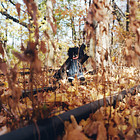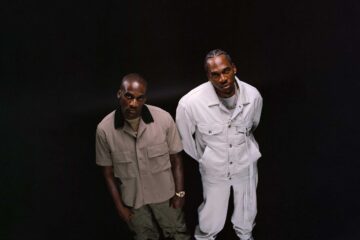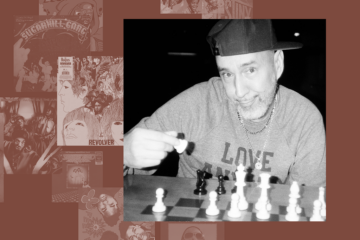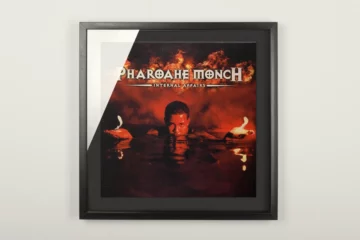»Nightmares didn’t come during dreams«
Billy Woods
It’s not really my style – I usually like more indirect introductions – but just to open the door: I think Billy Woods is one of the best underground rappers in the world. His impressive productivity as part of various projects, his work as founder of the great Backwoodz Studioz label, he is an absolute legend of abstract hip-hop. Like many rap fans, I found my way into this corner of hip-hop via Earl Sweatshirt, and over the years I’ve grown to love similar artists like MIKE or Navy Blue, but Billy Woods stands above them all.
Still, it took me a while to fully get into GOLLIWOG – the name of Billy Wood’s great new album. In fact, I kept putting off writing this lyric. Because I knew it was going to be hard; because the record was going to blow me away one hundred percent, but also drag me down. The whole attitude already pointed to that.
One almost feels the urge to turn on a trigger warning. To say that the themes of GOLLIWOG are dark would be an understatement: poverty, torture, suicide, hints of cannibalism. Billy Woods delivers his eloquence almost as if a demon of death were hovering beside him. »The English language is violence,« he raps – and skillfully sets this realization to music. Better than anyone else.
At the beginning of GOLLIWOG, you can hear the film reel starting to turn — it’s the start of a cinematic album. The ghostly sounds of a fairground ring out, which is especially creepy for those (like me) who are afraid of clowns. The opener is aptly named »Jumpscare«, although Billy Woods uses fewer jump scares in GOLLIWOG. Instead, he aims for a more psychological form of horror – there’s no ‘Texas Chainsaw Massacre’ here, but rather something more akin to ‘The Shining’. It’s the kind of horror that burrows deep into your mind.
The beat’s not feeling well
Despite his anonymity – the musician never shows his face, his real name is unknown – there is one obvious difference between him and one of his biggest influences, MF DOOM: In his songs, the New Yorker reveals personal things, but unlike the masked DOOM, he does so often and hardly ever through the flower. Billy Woods, the son of a Zimbabwean intellectual Marxist and a Jamaican literature professor, raps about the constant fear of living as a black man in this racist world (»My people fled to the mountains, but it’s nowhere the white man won’t go«); fear seems to him not to be a mood but a permanent state. Woods thus takes the horror of GOLLIWOG out of fiction and brings it into reality, into the here and now. Into his here and now.
This is especially harsh in »Waterproof Mascara,« probably the most depressing song of the year so far. Whereby »here and now« is actually wrong: Billy Woods tells of a pale memory when his mother told him and his siblings not to trust anyone. »There’s us in this room, that’s it!« she says – and with the last word, a dissonant, almost Hitchcockian piano chord breaks in. And what else? The beat consists mainly of the weeping sniffles of a broken woman. Phew.
Playing with time is a theme on GOLLIWOG anyway (»Way I see it, it ain’t no past tense«, »Time is on my side«): Billy Woods has always been characterized by a connection to history, but his new album is truly a leap into the past. While the previous album Maps was a kind of road trip and therefore easy to understand, GOLLIWOG is a different kind of journey and much more abstract: »I won’t be located«, says the closer. The rapper moves not only through places, but through time. Woods takes us back to days long gone, as the record was originally based on a horror story he wrote in elementary school and kept by his mother.
The theme was the character of the Golliwog – a black, cartoonish children’s book character with an ultra-racist background who was invented in the 19th century by cartoonist Florence Kate Upton, was extremely popular, and later made the rounds as a racist slur. When Billy Woods was reminded of the character and his childhood story based on it, the hook for his new album was clear. GOLLIWOG is a blurry buzz through today, yesterday and, unfortunately, tomorrow. A lot has changed since the 19th century, but by no means everything …
… as if you had drunk too much caffeine and then taken a sleeping pill.
This manipulation of time is also evident in the production of GOLLIWOG. (It’s his first album since 2019 to feature multiple producers; different Billy Woods modes are called upon by different producers, such as El-P, The Alchemist , or Kenny Segal.) The beats are broken, shattered and fragmented, as if they had been put through a time machine – again and again – and thus slightly alienated. They’re brash and yet laid-back, creating a certain push-and-pull effect: it’s as if you’re constantly rewinding and fast-forwarding the beats. At the same time.
Related reviews
This is emphasized by Billy Wood’s performance style. While the arrangements float and barely provide any support, he raps continuously, consistently and with unbelievable consistency; every consonant shoots brutally out of his mouth. But: at the same time he sounds anesthetized and numbing, seems as emotionless as he is full of rage, throws you forward and yet to the floor – as if you’ve drunk too much caffeine and then taken a sleeping pill. Heartbreak at its best.











